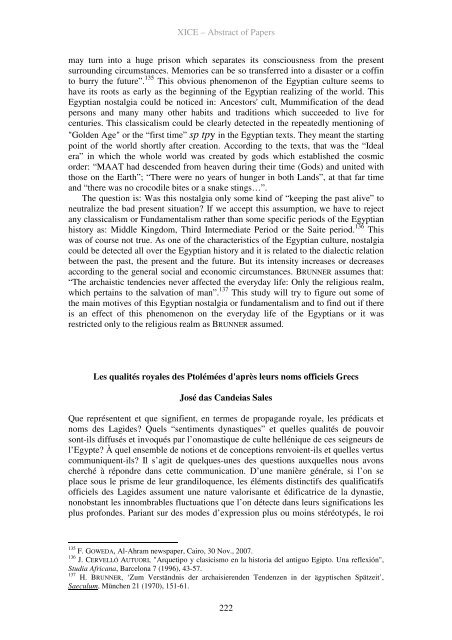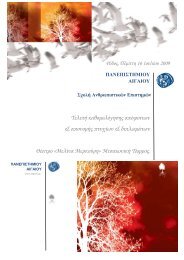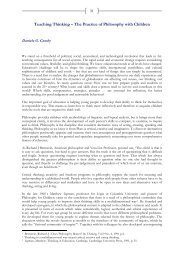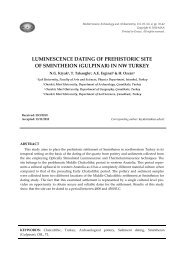Tenth International Congress of Egyptologists Abstracts of Papers
Tenth International Congress of Egyptologists Abstracts of Papers
Tenth International Congress of Egyptologists Abstracts of Papers
You also want an ePaper? Increase the reach of your titles
YUMPU automatically turns print PDFs into web optimized ePapers that Google loves.
XICE – Abstract <strong>of</strong> <strong>Papers</strong><br />
may turn into a huge prison which separates its consciousness from the present<br />
surrounding circumstances. Memories can be so transferred into a disaster or a c<strong>of</strong>fin<br />
to burry the future”. 135 This obvious phenomenon <strong>of</strong> the Egyptian culture seems to<br />
have its roots as early as the beginning <strong>of</strong> the Egyptian realizing <strong>of</strong> the world. This<br />
Egyptian nostalgia could be noticed in: Ancestors' cult, Mummification <strong>of</strong> the dead<br />
persons and many many other habits and traditions which succeeded to live for<br />
centuries. This classicalism could be clearly detected in the repeatedly mentioning <strong>of</strong><br />
"Golden Age" or the “first time” sp tpy in the Egyptian texts. They meant the starting<br />
point <strong>of</strong> the world shortly after creation. According to the texts, that was the “Ideal<br />
era” in which the whole world was created by gods which established the cosmic<br />
order: “MAAT had descended from heaven during their time (Gods) and united with<br />
those on the Earth”; “There were no years <strong>of</strong> hunger in both Lands”, at that far time<br />
and “there was no crocodile bites or a snake stings…”.<br />
The question is: Was this nostalgia only some kind <strong>of</strong> “keeping the past alive” to<br />
neutralize the bad present situation? If we accept this assumption, we have to reject<br />
any classicalism or Fundamentalism rather than some specific periods <strong>of</strong> the Egyptian<br />
history as: Middle Kingdom, Third Intermediate Period or the Saite period. 136 This<br />
was <strong>of</strong> course not true. As one <strong>of</strong> the characteristics <strong>of</strong> the Egyptian culture, nostalgia<br />
could be detected all over the Egyptian history and it is related to the dialectic relation<br />
between the past, the present and the future. But its intensity increases or decreases<br />
according to the general social and economic circumstances. BRUNNER assumes that:<br />
“The archaistic tendencies never affected the everyday life: Only the religious realm,<br />
which pertains to the salvation <strong>of</strong> man”. 137 This study will try to figure out some <strong>of</strong><br />
the main motives <strong>of</strong> this Egyptian nostalgia or fundamentalism and to find out if there<br />
is an effect <strong>of</strong> this phenomenon on the everyday life <strong>of</strong> the Egyptians or it was<br />
restricted only to the religious realm as BRUNNER assumed.<br />
Les qualités royales des Ptolémées d'après leurs noms <strong>of</strong>ficiels Grecs<br />
José das Candeias Sales<br />
Que représentent et que signifient, en termes de propagande royale, les prédicats et<br />
noms des Lagides? Quels “sentiments dynastiques” et quelles qualités de pouvoir<br />
sont-ils diffusés et invoqués par l’onomastique de culte hellénique de ces seigneurs de<br />
l’Egypte? À quel ensemble de notions et de conceptions renvoient-ils et quelles vertus<br />
communiquent-ils? Il s’agit de quelques-unes des questions auxquelles nous avons<br />
cherché à répondre dans cette communication. D’une manière générale, si l’on se<br />
place sous le prisme de leur grandiloquence, les éléments distinctifs des qualificatifs<br />
<strong>of</strong>ficiels des Lagides assument une nature valorisante et édificatrice de la dynastie,<br />
nonobstant les innombrables fluctuations que l’on détecte dans leurs significations les<br />
plus pr<strong>of</strong>ondes. Pariant sur des modes d’expression plus ou moins stéréotypés, le roi<br />
135<br />
F. GOWEDA, Al-Ahram newspaper, Cairo, 30 Nov., 2007.<br />
136<br />
J. CERVELLÓ AUTUORI, "Arquetipo y clasicismo en la historia del antiguo Egipto. Una reflexión",<br />
Studia Africana, Barcelona 7 (1996), 43-57.<br />
137<br />
H. BRUNNER, ‘Zum Verständnis der archaisierenden Tendenzen in der ägyptischen Spätzeit’,<br />
Saeculum, München 21 (1970), 151-61.<br />
222






